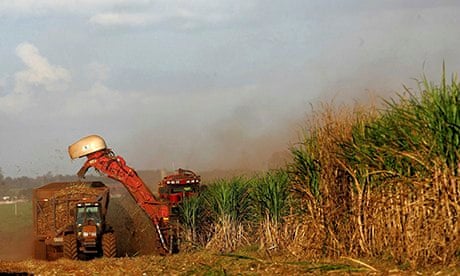Burning hundreds of millions of tonnes of staple foods to produce biofuels is a crime against humanity. Since 2007, the EU and US governments have given lavish support to agribusinesses to fill car fuel tanks with food – compulsory targets, and tax breaks and subsidies(pdf) worth billions annually. The result? Increased hunger, land grabbing, environmental damage and, ultimately, hundreds of thousands of lives lost.
Next month David Cameron and other EU leaders have an opportunity to intervene to put a halt to this idiocy when they vote in Brussels on the future of biofuels policy. With one child under 10 dying from hunger and related diseases every five seconds, they must do so.
It is ironic that biofuels are still promoted by some multinational corporations as an eco-friendly sustainable alternative to fossil fuels. Few, except those who directly profit from biofuels policies like the EU's 10% target for renewable transport energy, believe there are any environmental or social benefits. The reality is just another form of reckless exploitation of resources. Producing one litre of biofuels, for example, requires 2,500 litres of water.
EU policies promoting biofuels have, since 2008, diverted crops out of food markets at the bidding of powerful agribusinesses, in their pursuit of private profit. This use of large quantities of food and commodity crops for relatively small amounts of transport fuel has had three disastrous consequences.
First is an increase in world hunger. Almost all biofuels used in Europe are made from crops, such as wheat, soy, palm oil, rapeseed and maize, that are essential food sources for a rapidly expanding global population. Europe now burns enough food calories in fuel tanks every year to feed 100 million people.
Moreover, prices of vital foodstuffs such as oilseeds are expected to rise by up to 20% (pdf), vegetable oil by up to 36%, and maize by as much as 22% by 2020 because of EU biofuels targets (those that are being reviewed). For slum dwellers across the world, who have very little money with which to buy food, this represents disaster.
Second is a massive new demand for land, destroying smallholder farms as well as habitats. Land speculators, hedge funds, and agro-energy companies have been at the forefront of a global rush for land that has forced hundreds of thousands of smallholder farmers off their fields and taken away their livelihoods and water supplies. All too regularly across the world, but particularly in Africa, Asia and Latin America, the monopolisation of land by large biofuel corporations is accompanied by violence: the victims are small farmers and their families.
Third is environmental devastation. The demand for additional land to accommodate EU biofuels plans means expanding cropland, which will result in felled forests, plundered peatlands and ploughed prairies. The evidence is increasingly clear that the climate change benefits of most biofuels are negligible or nil.
Through fertiliser use, land clearance, deforestation and displacing other crops, most EU biofuels are not reducing carbon emissions – as they are subsidised to do – but emitting millions of additional tonnes of carbon dioxide into the atmosphere. The consumption of fossil fuels must be rapidly reduced – but solutions lie with the reduction of energy consumption, public transportation and alternative sources of clean energy, not land using biofuels with so many detrimental consequences.
It is time to stop this biofuels madness – which allows a few transnational corporations to make large profits while causing devastation to the environment and to millions of helpless victims. On 12 December, when EU leaders vote, they must immediately cancel targets and support for biofuels that compete with food. Failure to do so would make them an accomplice to a crime against humanity.
Jean Ziegler was UN special rapporteur on the right to food between 2000-08, is on the advisory committee of the UN human rights council. He is author of Betting on Famine: Why the World Still Goes Hungry. The European commission hosts European Development Days, a two-day conference starting today. One of the subjects to be discussed is the EU's policy coherence for development, a legally binding commitment on the trade bloc to take account of development in its policies

Comments (…)
Sign in or create your Guardian account to join the discussion